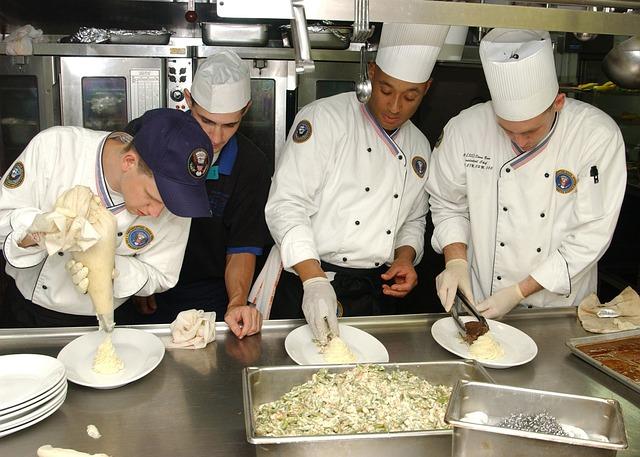The United Nations World Tourism Organization (UNWTO) recently held its inaugural Regional Forum on Gastronomy Tourism for africa, a landmark event aimed at harnessing the continent’s rich culinary heritage to boost tourism and sustainable advancement. Set against the breathtaking backdrop of Victoria Falls, Zimbabwe, the forum gathered stakeholders from across Africa, including government representatives, industry experts, and local entrepreneurs, to explore innovative strategies that celebrate and promote African gastronomy. This gathering not only marked a pivotal moment for the advancement of tourism in the region but also underscored the potential of culinary experiences to drive economic growth, strengthen cultural ties, and foster sustainable practices. As the world increasingly recognizes the importance of food as a cultural expression, this forum positioned Africa as a vibrant player in the global gastronomy tourism landscape.
UN Tourism Highlights the Potential of Gastronomy Tourism in Africa
At the recent forum held at the picturesque Victoria Falls, stakeholders across the African continent came together to explore the untapped potential of culinary experiences as drivers of tourism.The event highlighted how gastronomy tourism can foster economic growth, promote cultural heritage, and enhance community engagement. The diverse culinary landscapes of Africa, ranging from the spicy street foods of Morocco to the savory dishes of south-central Nigeria, provide a rich tapestry for tourists, enhancing their travel experiences while simultaneously supporting local economies.
Key discussions revolved around strategies to leverage local ingredients and traditional cooking methods to create unique dining experiences that reflect Africa’s rich cultural diversity. Participants emphasized the importance of collaboration among various sectors, including agriculture, hospitality, and education, to ensure sustainable practices are implemented. This collaborative approach aims to provide visitors with authentic culinary journeys that not only delight the palate but also narrate the stories of the land and its people. The forum underscored several actionable strategies for stakeholders:
- Development of Culinary Trails: Designing guided tours that showcase local markets, farms, and dining venues.
- Training Programs: Enhancing skill sets of local chefs and food artisans to elevate culinary standards.
- Promotion of Local Ingredients: Encouraging the use of indigenous produce to create unique dishes that tell a story.
- Community Engagement: Involving local communities in tourism planning to ensure benefits are fairly distributed.
the forum served as a pivotal platform for sharing best practices and forging partnerships aimed at unlocking the immense potential of gastronomy tourism, setting the stage for a new wave of sustainable and enriching travel experiences across Africa.

Exploring the Unique Culinary heritage of the African Continent
The vibrant tapestry of Africa’s culinary landscape is a testament to the continent’s rich cultural diversity and historical influences. Each region boasts its own distinct flavors and ingredients, shaped by local traditions and available resources.From the spicy stews of North Africa to the savory barbecues of Southern Africa, culinary practices frequently enough reflect centuries of adaptation and ingenuity. With the rise of gastronomy tourism, ther’s a growing interest in not just consuming these dishes, but understanding the stories behind them. This dialog is essential in promoting sustainable tourism practices that celebrate local produce while empowering communities.
During the recent UN Tourism Forum, stakeholders explored key elements that define Africa’s gastronomic identity, emphasizing the meaning of indigenous ingredients and traditional cooking methods. Highlights included:
- Farm-to-table initiatives promoting local agriculture and reducing carbon footprints.
- Culinary workshops that teach visitors how to prepare local dishes.
- Food festivals celebrating seasonal harvests and traditional practices.
Furthermore, discussions emphasized the importance of establishing a cohesive gastronomic brand for Africa that highlights the continental unity while respecting regional uniqueness. Efforts to create a database showcasing local chefs and culinary experts could enhance data sharing and promote collaborative efforts across borders, safeguarding the rich heritage of African cuisine for future generations.

The Economic Impact of Gastronomy Tourism in Regional Development
The convergence of gastronomy and tourism has emerged as a formidable avenue for regional development, especially in areas seeking to harness their culinary heritage. by showcasing local cuisine,cities and regions can attract a diverse array of tourists,thus stimulating local economies. This form of tourism fosters a unique connection between travelers and destinations, leading to increased spending on food, accommodations, and local attractions. by emphasizing distinct culinary experiences,municipalities are not only preserving their culinary traditions but also leveraging them to create sustainable economic growth. Notably, gastronomy tourism often showcases regional produce, which in turn supports local farmers and food artisans, thus intertwining economic prosperity with cultural preservation.
Moreover, the impact of gastronomy tourism extends beyond immediate financial benefits; it facilitates community engagement and enhances quality of life for residents. Regions hosting food festivals,cooking classes,and farm-to-table events see an influx of both visitors and investment. This leads to the creation of jobs in various sectors including hospitality, agriculture, and retail, while promoting skills development among the local workforce. the following table illustrates the potential economic contributions of gastronomy tourism:
| Impact Area | Projected Contribution |
|---|---|
| Local Economic Growth | 20% increase in local GDP |
| Job Creation | 1,000 new jobs in tourism and hospitality |
| Support for Local Producers | 15% rise in local agricultural sales |
| Cultural preservation | 20+ traditional recipes revitalized |

Strengthening Collaboration Between Local Producers and Tourism Stakeholders
As the first regional forum on gastronomy tourism unfolds at the breathtaking Victoria falls,Zimbabwe,the importance of synergy between local producers and tourism entities becomes increasingly evident. This collaboration aims to harness the potential of Africa’s rich culinary heritage, which can serve as a powerful catalyst for sustainable tourism growth. By integrating local flavors and traditions into hospitality offerings, stakeholders can create authentic experiences that resonate with visitors and foster deeper cultural exchanges.
To ensure a thriving partnership that benefits both local economies and travelers, various strategies can be employed:
- Engaging Workshops: Facilitate training sessions that connect local chefs with tourism operators to foster creativity and innovation in menu design.
- promotion of Local Ingredients: Encourage restaurants and hotels to source ingredients from nearby farms, thereby reducing carbon footprints and supporting local farmers.
- Cultural Exchange Programs: Develop initiatives where tourists can participate in cooking classes or traditional food festivals, encouraging direct interaction with local producers.
| Stakeholder | Potential Contribution | Expected Outcome |
|---|---|---|
| Local Farmers | Supply fresh produce | Enhanced food quality in tourism |
| Chefs | Develop unique recipes | attract more tourists with diverse offerings |
| Tour Operators | Create themed tours | Increase visitor engagement and satisfaction |

Recommendations for Sustainable Gastronomy Practices in Tourism
To promote sustainable gastronomy tourism in Africa, several best practices should be emphasized. First, supporting local farmers and producers is crucial. This can enhance the local economy and ensure that authentic culinary experiences reflect regional traditions. Second, it is significant to incorporate seasonal and organic ingredients into menus, as this not only reduces carbon footprints but also encourages sustainable agricultural practices. Establishments should prioritize partnerships with local markets and farm-to-table initiatives,fostering a culinary landscape that values freshness and ethical sourcing.
Furthermore, educating both tourists and hosts about the cultural significance of local dishes can enrich the gastronomic experiance. Sharing stories and traditions behind meals creates a deeper connection to the region’s heritage. Additionally, businesses should embrace waste reduction strategies, such as composting food scraps and minimizing packaging materials. Implementing an awareness campaign on food waste among tourists can lead to more mindful consumption.To assist in planning sustainable tourism experiences, the following table outlines key actions and benefits:
| Action | Benefit |
|---|---|
| Engage local suppliers | Boost local economy |
| Focus on seasonal menus | Reduce environmental impact |
| Educate tourists on local cuisine | Enhance cultural immersion |
| Implement waste reduction programs | promote sustainability |

Showcasing Local Flavors: Strategies for Successful Gastronomy Events
As the UN Tourism hosts its inaugural regional forum on gastronomy tourism in Africa,participants are encouraged to think creatively about how to truly represent the unique culinary identity of their locales. Emphasizing the importance of local ingredients,chefs are urged to collaborate with nearby farmers and suppliers to create authentic dishes that reflect regional heritage. Engaging local communities not only enhances the gastronomic experience but also promotes sustainable practices and stimulates local economies.
Effectively showcasing local flavors involves employing several strategic approaches:
- Themed Events: Organize events around specific local dishes or agricultural harvests to attract visitors and create a buzz.
- Culinary Trails: Develop themed trails that guide participants to various local eateries and farms, providing a comprehensive taste of the region.
- Workshops and Demonstrations: Host cooking classes led by local chefs, allowing participants to learn about traditional techniques and recipes.
- Collaboration with Influencers: Partner with food bloggers and social media influencers who can share their experiences and reach wider audiences.
By implementing these strategies, gastronomy events can serve not just as culinary showcases but as platforms for cultural exchange, education, and community engagement. It is crucial to create an atmosphere where guests not only savor delicious local food but also gain insights into the stories and traditions behind every dish, fostering a deeper gratitude for the rich tapestry of African gastronomy.
Insights and Conclusions
the inaugural Regional Forum on Gastronomy Tourism for Africa, hosted by the United nations World Tourism Organization at the breathtaking Victoria falls, marks a significant step towards promoting the continent’s rich culinary heritage. With representatives from various countries engaging in vital discussions on sustainable practices and innovative strategies, this event highlights the crucial role gastronomic tourism can play in economic growth, cultural exchange, and community development across Africa.As nations collaborate to harness the potential of their unique food cultures, the forum sets the stage for a new era of tourism that not only celebrates Africa’s diverse offerings but also fosters sustainability and resilience in the travel industry. The ripple effects of this forum will likely be felt across the continent, inspiring a renewed focus on culinary tourism as a vehicle for growth and unity. As the world takes notice, it becomes clear that Africa’s culinary landscape is not just a feast for the senses; it is also a powerful force for change.







